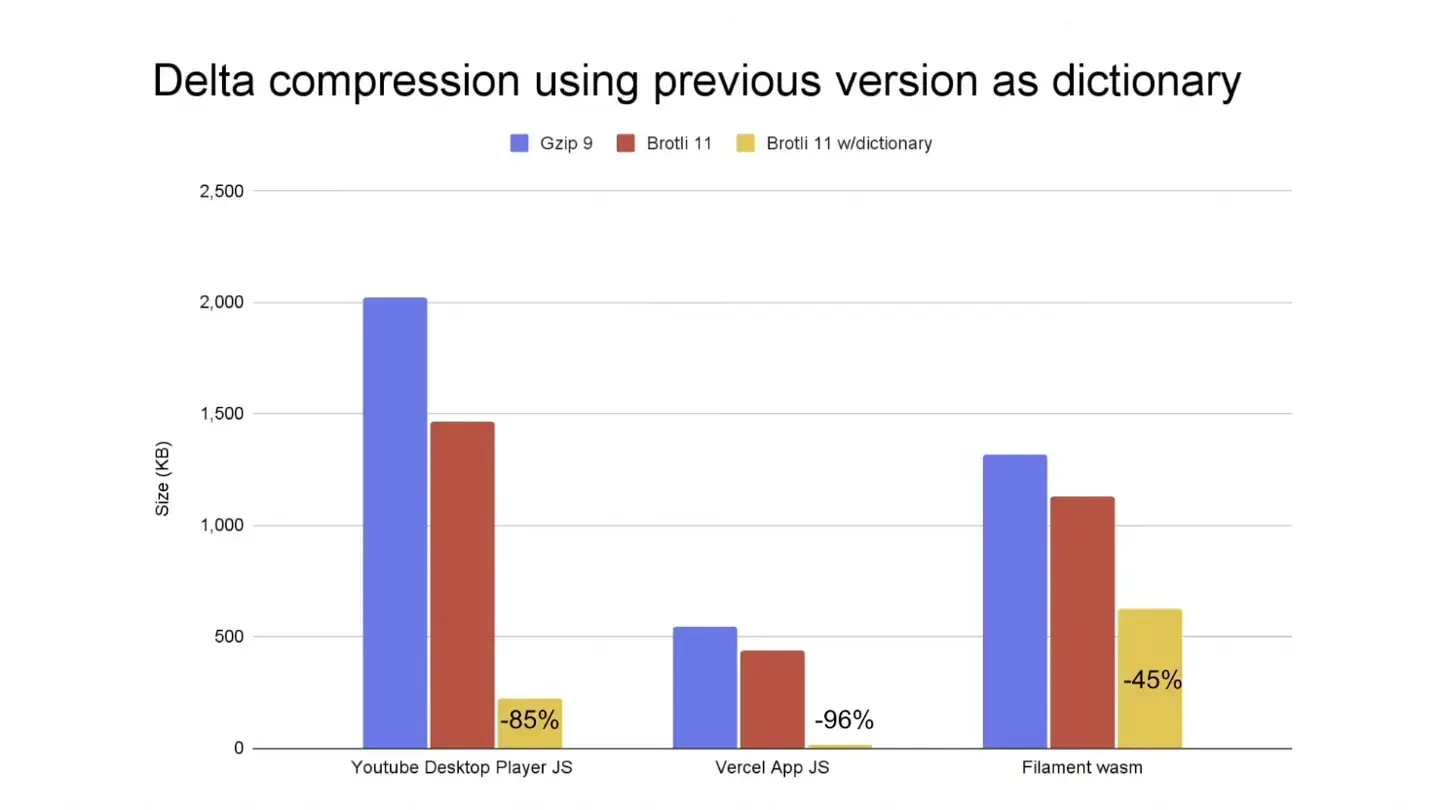Google Chrome, a leading web browser, is at the forefront of testing innovative technologies to enhance web performance. One such advancement is the implementation of shared dictionary compression technology. In a recent official press release, Google confirmed that its development team is working on implementing shared dictionary compression technology in the Chrome browser. The company claims that this solution can improve website loading efficiency by more than 90%. Developers can currently test the use of Brotli or ZStandard compression algorithm dictionaries on their websites to help Google improve related features.

The Google team uses the Angular framework as an example. Assuming that the website is built using the Angular1.7.9 version framework, the file size is 172 KB without compression. If the Brotli compression algorithm is used, the file size can be reduced to 53 KB. This means that the file size can be nearly 70% smaller simply by using the Brotli compression algorithm.
However, if you use the custom shared dictionary function, you can use the resource dictionary of the previous version to compress the resources of the new version. In this way, the actual output file is only 4 KB, reaching a compression rate of nearly 98%. Therefore, “it can greatly improve the web page” loading speed.
Evolution of Compression Technologies
Data compression has long been a crucial tool for optimizing web performance by reducing the size of page resources. Initially, gzip was commonly used for compressing text-based resources like HTML, CSS, and JavaScript files. However, recent years have seen significant advancements in compression techniques. In 2016, Chrome introduced the Brotli algorithm, followed by ZStandard compression in later updates. These technologies have revolutionized compression ratios for web resources.
Shared Dictionaries: A Game-Changer
The latest development from the Chrome team involves shared dictionaries, which are now available in an origin trial for both Brotli and ZStandard compression methods. Shared dictionaries work by supplementing existing compression algorithms to achieve even higher compression ratios, sometimes exceeding 90%. By utilizing custom user-curated dictionaries containing specific patterns relevant to particular resources, Chrome aims to further boost compression efficiency.
According to the press release, the Brotli and ZStandard compression algorithms can also be used with a custom shared dictionary to achieve higher web page efficiency. This is because the custom dictionary is an external file and can be applied to any input. These dictionaries can be product codes or any content that is highly specific to a single application. Also, the suitability of the dictionary for the input may have a huge impact on the overall compression efficiency. For this reason, matching a dictionary that is highly similar to the input content can achieve a higher compression rate.

Currently, the Chrome team is open to trials of shared dictionary compression technology. Individual testing can enable the Compression Dictionary Transport experimental feature in the Chrome browser. Developers need to register in Chrome’s Origin Trial to obtain a token, and then use the token on the website to enable sharing. Related compression functions.
How Shared Dictionaries Work
Shared dictionaries enhance compression by identifying redundant sequences in input data and utilizing this information to create significantly smaller outputs that can be decompressed later. These dictionaries contain additional patterns that algorithms like Brotli and ZStandard can leverage during compression. Custom dictionaries tailored to specific applications or content types can greatly impact compression efficiency. This will lead to substantial reductions in resource load times.
Practical Application: Custom Compression Dictionaries
To illustrate the effectiveness of custom compression dictionaries, consider a scenario where a website utilizes the Angular framework. Upgrading from version 1.7.9 to 1.8.3 results in similar-sized resources. By applying Brotli compression with default settings, a nearly 70% compression ratio is achieved. Custom dictionaries tailored to specific frameworks or content types can further optimize compression efficiency.
Implications and Future Prospects
The introduction of shared dictionary compression technology in Chrome signifies a significant leap towards enhancing web browsing speed and efficiency. While there are discussions around privacy implications and optimization strategies for generating custom dictionaries, the potential benefits for large web applications that frequently ship incremental changes are substantial.

Conclusion
In conclusion, Google Chrome’s implementation of shared dictionary compression technology represents a pivotal advancement in web performance optimization. By supplementing existing compression algorithms like Brotli and ZStandard with custom dictionaries, Chrome aims to achieve compression ratios exceeding 90%, significantly reducing resource load times for web pages.
The evolution of compression technologies, from gzip to Brotli and ZStandard, has revolutionized web performance optimization. Shared dictionaries now offer a game-changing approach by identifying redundant sequences in input data. It also leverages custom patterns for enhanced compression efficiency.
Practical applications of custom compression dictionaries, such as those tailored to specific frameworks like Angular, demonstrate the tangible benefits of shared dictionary compression technology. By significantly reducing file sizes while maintaining data integrity, this innovation promises to enhance the browsing experience for users and streamline web development processes for developers.
While discussions around privacy implications and optimization strategies for generating custom dictionaries continue, the potential benefits for large web applications that frequently ship incremental changes are substantial. Chrome’s commitment to innovation and performance optimization underscores its leadership in the browser market. It is setting a precedence for future advancements in web technology.
Overall, the introduction of shared dictionary compression technology in Chrome reflects a concerted effort to push the boundaries of web performance optimization and deliver a faster, more efficient browsing experience for users worldwide. As developers continue to explore and harness the capabilities of this technology, the future of web browsing holds promise for even greater speed, efficiency, and user satisfaction.




